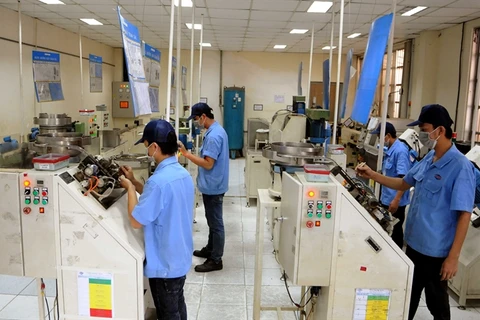Hanoi (VNA) – A digital economy is an inevitable step for development as the traditional economy is being saturated, said Nguyen Thanh Hung, Deputy Minister of Information and Communications at the 2016 Internet Day event in Hanoi.
The Vietnam Internet Association on December 21 organised the event under the theme “How digital content contributes to an Internet economy?”
The wide application of information technology (IT) in all activities of a digital economy will bring about high profits, he said.
“Many countries have defined the digital economy as a new developmental driving force for their socio-economic growth and development, as well as enhancing the national competitive capacity on a global scale,” Hung said.
In recent years, the digital content industry in Vietnam has seen remarkable development, playing a more important role in the country’s IT sector.
The industry’s revenue increased from 480 million USD to 1.4 billion USD in the 2008-2014 period with a yearly growth rate of about 20 percent. It attracted more than 4,500 enterprises, creating 70,000 jobs.
Until now, Vietnam has built a diverse digital content industry, including online products for education, entertainment and content for mobile devices, Hung said.
The Deputy Minister said that the digital economy industry will create favourable conditions to boost and develop the digital content into a key sector of the country’s IT industry.
With advantages such as young human resources, competitive labour costs, a sharp increase in smart phones and 3G subscriptions and a developing Internet infrastructure, Vietnam is evaluated as one of the potential markets of the digital industry, said Hung.
“This is also an opportunity for Vietnamese companies to join the global supply chain of the digital economy in general and digital content supply chain in particular”, he added.
However, he emphasised that the result is not proportional with the country’s potential, digital content revenue remains modest compared to the whole IT sector’s income.
Therefore, Hung asked telecommunication enterprises to focus on developing infrastructure of transmission and telecommunications, applying modern high-quality technology to provide safe services to people.
Sharing at the event, Le Hong Minh, VNG CEO, said for those under 25 years old, Internet means smartphones rather than PCs. “It is similar to the case of changing from black and white television to colour television”, he explained.
“The number of smartphone users will increase 30 times by 2020 compared to 2010 and accounted for nearly 60 percent of the Vietnamese population. Therefore, the opportunities for mobile Internet will be 40-100 times higher than PC Internet,” Minh said.
To illustrate the development of mobile Internet, Minh gave statistics of the development of mobile games (40 percent), m-commerce (60 percent) and mobile payments (80 percent).
Internet Day is an annual event initiated by the Vietnam Internet Association. It is an occasion for enterprises operating in the Internet field, association members, domestic and international technology companies, government representatives and state management agencies to meet, exchange and share experience to develop the Internet, and accelerate application, content and technology services./.
The Vietnam Internet Association on December 21 organised the event under the theme “How digital content contributes to an Internet economy?”
The wide application of information technology (IT) in all activities of a digital economy will bring about high profits, he said.
“Many countries have defined the digital economy as a new developmental driving force for their socio-economic growth and development, as well as enhancing the national competitive capacity on a global scale,” Hung said.
In recent years, the digital content industry in Vietnam has seen remarkable development, playing a more important role in the country’s IT sector.
The industry’s revenue increased from 480 million USD to 1.4 billion USD in the 2008-2014 period with a yearly growth rate of about 20 percent. It attracted more than 4,500 enterprises, creating 70,000 jobs.
Until now, Vietnam has built a diverse digital content industry, including online products for education, entertainment and content for mobile devices, Hung said.
The Deputy Minister said that the digital economy industry will create favourable conditions to boost and develop the digital content into a key sector of the country’s IT industry.
With advantages such as young human resources, competitive labour costs, a sharp increase in smart phones and 3G subscriptions and a developing Internet infrastructure, Vietnam is evaluated as one of the potential markets of the digital industry, said Hung.
“This is also an opportunity for Vietnamese companies to join the global supply chain of the digital economy in general and digital content supply chain in particular”, he added.
However, he emphasised that the result is not proportional with the country’s potential, digital content revenue remains modest compared to the whole IT sector’s income.
Therefore, Hung asked telecommunication enterprises to focus on developing infrastructure of transmission and telecommunications, applying modern high-quality technology to provide safe services to people.
Sharing at the event, Le Hong Minh, VNG CEO, said for those under 25 years old, Internet means smartphones rather than PCs. “It is similar to the case of changing from black and white television to colour television”, he explained.
“The number of smartphone users will increase 30 times by 2020 compared to 2010 and accounted for nearly 60 percent of the Vietnamese population. Therefore, the opportunities for mobile Internet will be 40-100 times higher than PC Internet,” Minh said.
To illustrate the development of mobile Internet, Minh gave statistics of the development of mobile games (40 percent), m-commerce (60 percent) and mobile payments (80 percent).
Internet Day is an annual event initiated by the Vietnam Internet Association. It is an occasion for enterprises operating in the Internet field, association members, domestic and international technology companies, government representatives and state management agencies to meet, exchange and share experience to develop the Internet, and accelerate application, content and technology services./.
VNA






















